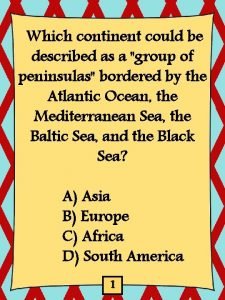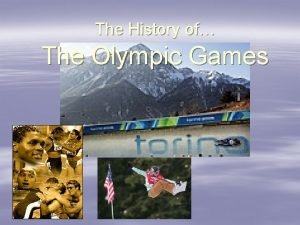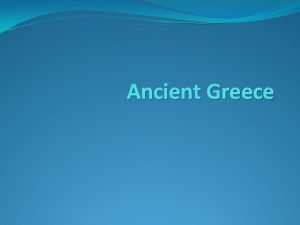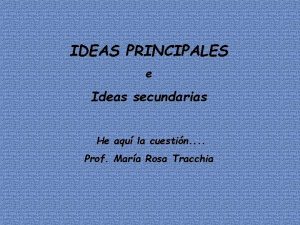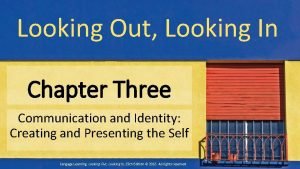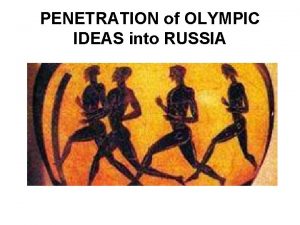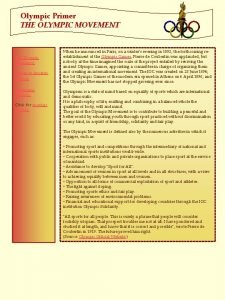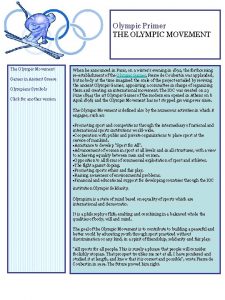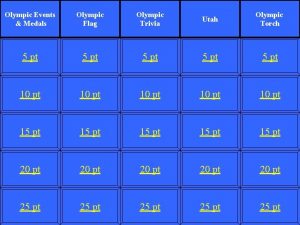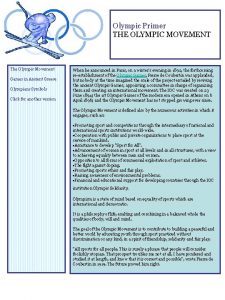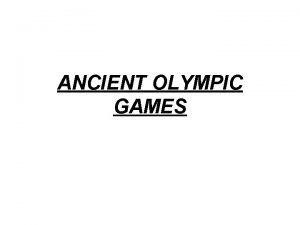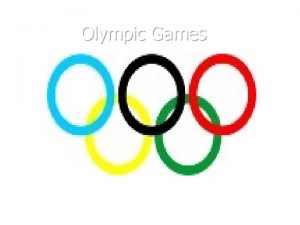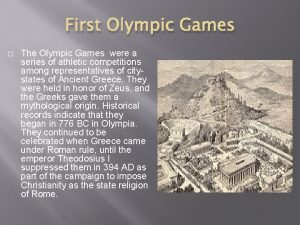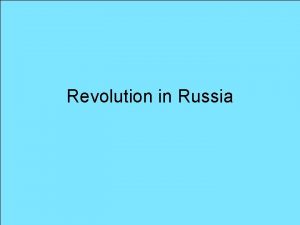PENETRATION of OLYMPIC IDEAS into RUSSIA The first


















- Slides: 18

PENETRATION of OLYMPIC IDEAS into RUSSIA

The first data on ancient Greek Olympic Games became known in the first millenium B. C. to inhabitants of cities northern part of the Black Sea region, and also ancient Armenia, Georgia, Kazakhstan and Central Asia, which subsequently were included into structure of Russian empire. In those early times on the Black Sea coast the Greek colonies were scattered. Among them there were allocated Olvia, Khersonese, Panticapei, Fanagoria etc. Tribes of Scythians and the Sarmatians wandered in steppes of sea region keeping close relations with the Greek colonies that promoted distribution the Greek culture among them.

In the Greek colonies on the example of mother country there were set up schools, palaestras, competitions were held and winners were awarded. At excavation close to the town Anapa the lists of winners in running contest devoted to mythical Hermes were found.

Arc. Goodwill Games heological findings testify that athletes from the richest families of the Greek colonies quite often took part in national Greek contest games in Greece. There are data, depicting that special ambassadors were sent to colonies of the Black Sea region to inform and invite participants to forthcoming Olympic games in Greece. In some games in Olympia athletes of the Armenian and Georgian Imperial sorts took part. It is known that Varazdat from Artaksat the ancient capital of Armenia became the winner in fisticuffs at one of the last Olympic Games held in Ancient Greece

Later on as a result of decline of an ancient art under the influence of Christianity, in 394 our era Olympic Games were prohibited and the data about Olympic Games have disappeared from memory of mankind for ten centuries. Only during the Renaissance period the process of revival of the forgotten antique traditions was started. People have recollected the Olympic Games.

Russia also was not staying aside the process of Olympic idea revival. In XV century in our country again some information about Games of Ancient Ellada have appeared. Just at that time in Moscow there was found the work of Bulgarian writer Isai, who made translations of compositions of the Greek philosopher Dionisiy Areopagit.

In that place where ancient Olympia was designated one Russian copyist has made the additions in old Slavic language, which are not mentioned neither in original Dionisiy, nor in Isai' translation. In this addition one can read the following: «Olympiads name five kinds of competitions. The first — fight by fists! The second — wrestling! The third — to run and go by chariots! The fourth — to jump! The fifth — to throw stones! And it was like a holiday arranged every fifth year when the set of people from all countries gathered and games were held. And those who won, were awarded with a wreath of a victory. One winner received a wreath from leaves of an olive tree, the second one — something else, the third one — something appropriate to a victory» .

Acknowledgement of this message in Russian State occurred just at the right time when it aspired to ratify the national interest and national traditions in all spheres of public life including the field of games, physical exercises and entertainment. In the course of the next centuries the knowledge of ancient Olympic Games developed interest of scientific and social part of society. On boundary of the XVII-XVIII Кiev. Моgilyansk Board and Slavic. Greek-Latin Academy centuries when there were founded Кiev. Моgilyansk Board and Slavic. Greek-Latin Academy, where the Greek language was studied, there were found references to ancient Olympic holidays in philosophical and literary works.

It is known, that the great Russian scientist M. V. Lomonosov tried to put into life the idea to hold holidays like Olympic games in Russia. He put this idea in one line with such tasks as «… preservation and duplication of Russian people» and was going to write a special work devoted to Olympiads.

Lomonosov twice applied to concept «Olympic games» . In his article «About preservation of health» (1741 -1742) he wrote the next lines: «… Chillon, one of the seven Greek wise men, has died … of pleasure when his son in Olympic games has got a bribe» .

Later, approximately in 1759 -1761, Lomonosov has included «Olympic games» in the list of important subjects, on which he thought it necessary to present his considerations. Unfortunately, his intention was not realized.

Probably, Lomonosov's ideas have induced the Russian Empress Ekaterina II to arrange in 1766 original tournament — competition in art of riding in magnificent luxurious suits that referred to as «a court roundabout» .

This roundabout was held twice on June, 16 and on July, 11 the same year. In front of the Winter Palace there was built a special amphitheater in which «rates» were held, in our understanding — horse races, first ladies' on chariots competed, and then cavalrymen riding horseback.

Among prizes handed there were gold and silver medals. The inscription on some of them looked like this: «From Alfey to Neva coasts» . This inscription tells us about a direct communication of the Petersburg roundabouts with ancient Olympic holidays, so as the last were held, as is known, in Ancient Greece in a valley of the river Alfej.

In works of many Russian scientists, poets and writers the idea and principles of ancient Olympic Games also find reflection. Concerning cultural assignment of Olympic holidays in Ancient Greece the great Russian historian N. M. Karamzin wrote in «Histories of the Russian State» following: «During famous Olympic Games the noise disappeared, and crowds kept silence around Gerodot, reading legend of centuries» .

И кто сочтет разноплеменных, Сим торжеством соединенных? Пришли отвсюду: от Афин, От древней Спарты, от Микин, С пределов Азии далекой, С Эгейских вод, с Фракийских гор. . . И сели в тишине глубокой, И тихо выступает хор. The poet E. A. Baratynsky also mentions it in one of his poems. The remarkable Russian poet V. A. Zhukovsky, who translated the myth of Ancient Greece «Ivikov cranes» , has insipidly told how people were gathering from all the parts of Ellada to take part in the national Greek holidays.

In magazine of the Ministry of National Education (1856) Peter Tihanovich has published «Sketches of gymnastic games of ancient Greeks» . He wrote that Olympic holidays brought together representatives of the great Greek people, distributed over the large territory, inspired with the one idea, one feeling — the idea of a holiday, feeling of a holiday.

The theme of Olympic games as it was marked above, has found its reflection in N. A. Dobroljubova's creative activity. The famous critic and the publicist, she wrote about it in the story «Fear to enemies» . In I 860 at an exhibition of the Academy of arts works, in which ideas of Olympic games were reflected were exposed. The artists V. V. Vereshchagin, N. D. Dmitriev were awarded with a gold medal. Sculptor I. P. Panfilov in 1871 has received a gold medal for a bas-relief «Olympic games of discus throwers» .
 The geographic feature most responsible for extensive trade
The geographic feature most responsible for extensive trade Where is the first olympic held
Where is the first olympic held Ancient olympic flag
Ancient olympic flag 776 bc first olympic games
776 bc first olympic games Ideas have consequences bad ideas have victims
Ideas have consequences bad ideas have victims Ideas principales e ideas secundarias
Ideas principales e ideas secundarias Corner joint weld symbol
Corner joint weld symbol Welding incomplete penetration
Welding incomplete penetration Excessive concavity
Excessive concavity Cost of standard penetration test
Cost of standard penetration test Destroyer pricing
Destroyer pricing Pen testing roadmap
Pen testing roadmap Septal penetration artifact
Septal penetration artifact Identity management looking out looking in
Identity management looking out looking in Penetration pricing
Penetration pricing Hydra penetration testing
Hydra penetration testing Salary range penetration
Salary range penetration Welding types and symbols
Welding types and symbols Intermittent weld symbol
Intermittent weld symbol
